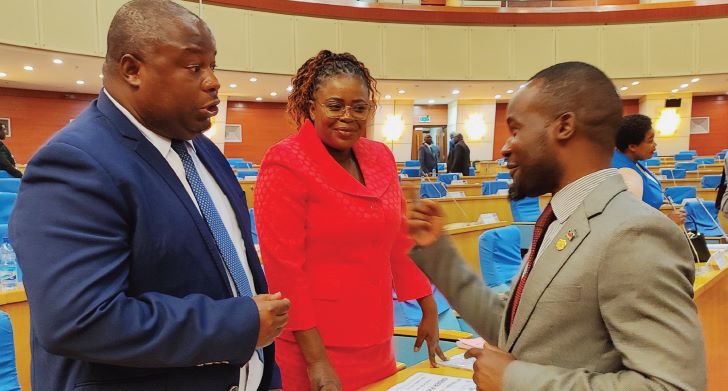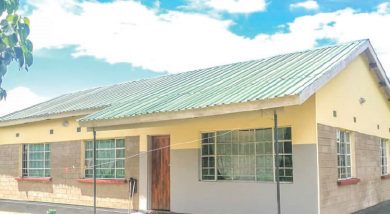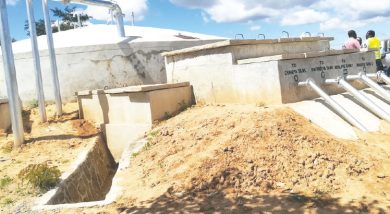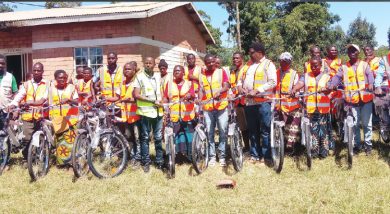Gwengwe elated as budget passes
Minister of Finance and Economic Affairs Sosten Gwengwe could not hide his excitement yesterday after Parliament passed the K3.78 trillion 2023/24 National Budget recovery after Tropical Cyclone Freddy’s destruction. re-designed to accommodate
When First Deputy Speaker of Parliament Madalitso Kazombo, sitting as chairperson of the Committee of Supply, announced the approval of the fiscal plan at 4.40 pm, the House burst into a lengthy round of applause.

It was, most assuredly, a sigh of relief, especially for Gwengwe and the government side, as it marked the end of an 18-day scrutiny of the fiscal plan that will hold the country’s destiny for the next 12 months effective April 1.
Gwengwe said: “It’s one of the most difficult budgets to put together because after the planning had already been done, Cyclone Freddy hit. We had to go back to the drawing table to prioritise and recast the budget. That has not been an easy task.”
The minister said most resources are being channelled towards rebuilding the infrastructure damaged by the storm in the Southern Region.
He said: “This sphere [Southern Region] of the nation has been under severe strain. Over 1 000 are feared to have died and multi-billion kwacha worth of infrastructure was destroyed leaving over 50 000 households displaced.
“There have been a lot of resources channelled towards maintainance… We cannot just wait for the partners to mobilise for us because sometimes there is time lag.
“That’s why there is a provision that is going towards Roads Authority. It should be no less than K45 billion and this is up from the K9 billion that was allocated earlier before Freddy.”
The investment towards maintenance will come at a cost for the government’s ministries, departments and agencies (MDAs) as some have lost a portion of their Other Recurrent Transactions, funds for salaries and operation costs.
Meanwhile, Gwengwe has since warned the MDAs to stick to their budget lines by adjusting their spending habits.
“If they [MDAs] continue travelling and behave the normal way, then they will end up overblowing their budgets,” he said.
The minister also announced measures that to control expenditure by government institutions funding in the new financial year will be on quarterly allotments.
He said: “What it means is that at the end of a quarter you [MDAs] will need to account how the resources were spent so that we can keep a check and a keen eye on the MDAs as we execute the budget.”
The budget approval followed two days of vote by vote scrutiny under the Committee of Supply.
Yesterday, law enforcement and governance institutions also got their approvals. The Malawi Police Service vote was pegged at K94.6 billion, the Anti-Corruption Bureau vote at K6.7 billion, Malawi Human Rights Commission vote at K2.05 billion and Legal Aid Bureau vote at K2.1 billion. Earlier, the Committee of Supply tussled to a p p r o v e K 5 b i l l i on a l l o c a t i o n t o t h e Unforeseen Expenditure vote which initially was allocated K2 billion.
Gwengwe had argued that the funds were increased to create a financial buffer for response to Cyclone Freddy, but opposition p a r l i a m e n t a r i a n s l ed b y Democ r a t i c Pr o g r e s s i v e Pa r t y (DPP) spokesperson on Finance Ralph Jooma and Chitipa South legislator Welani Chilenga (DPP) questioned why the government did not direct ly add the K3 billion to the Department of Disaster Management Af f a i r s ( D o d m a ) allocation.
After a heated debate that threatened to derail the vote scrutiny, the vote passed after Leader of the House Richard Chimwendo Banda stated that Dodma’s funding was already passed on Wednesday, could not form part of the debate.
Meanwhile, Budget and Finance Committee of Parliament chairperson Gladys Ganda described the deliberations as fair. The budget sum was trimmed from the initial K3.8 trillion to K3.7 trillion in the wake of the cyclone impact which threatens achievement of key economic indicators, notably inflation rate and economic growth rate.





